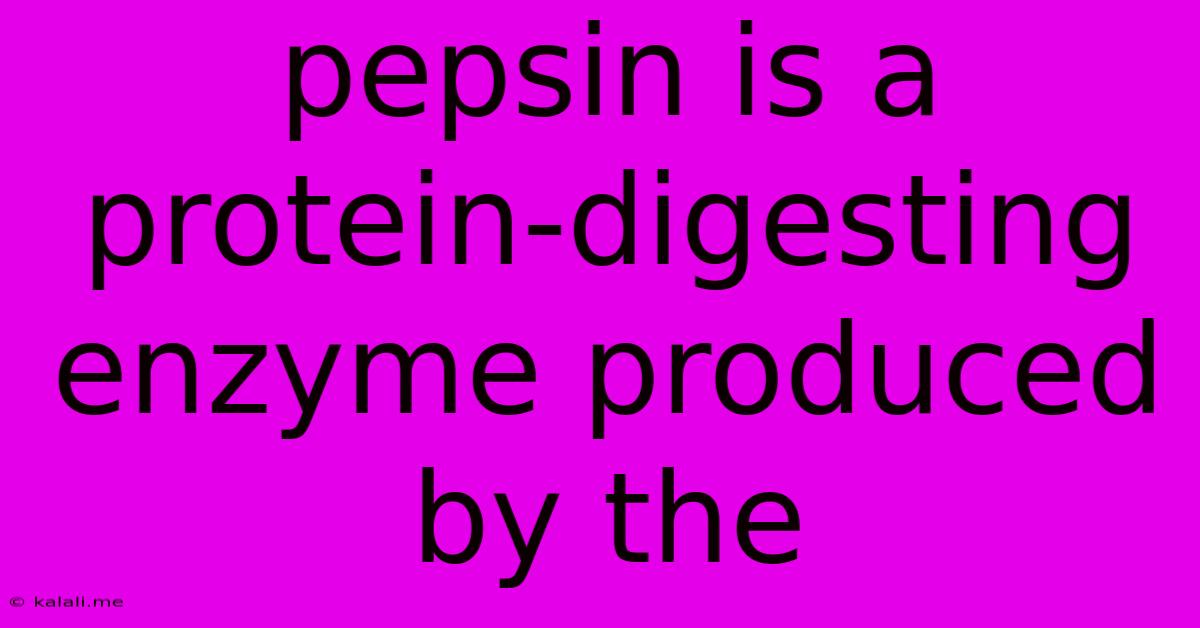Pepsin Is A Protein-digesting Enzyme Produced By The
Kalali
Jun 14, 2025 · 3 min read

Table of Contents
Pepsin: The Stomach's Protein-Digesting Enzyme
Meta Description: Learn about pepsin, the crucial protein-digesting enzyme produced by the stomach. This article explores its function, activation, optimal pH, and importance in digestion. Discover how pepsin contributes to overall health and potential issues related to its dysfunction.
Pepsin is a crucial enzyme primarily responsible for the initial breakdown of proteins in the stomach. It's a key player in the complex process of digestion, initiating the hydrolysis of dietary proteins into smaller peptides, preparing them for further enzymatic action in the small intestine. Understanding pepsin's role, its activation process, and its optimal working conditions is vital for comprehending the intricacies of human digestion and maintaining overall gut health.
Where is Pepsin Produced?
Pepsin is produced in the stomach by chief cells, also known as peptic cells. These specialized cells are located within the gastric glands lining the stomach mucosa. The chief cells synthesize and secrete pepsinogen, the inactive precursor of pepsin. This inactive form is crucial to prevent the enzyme from digesting the stomach's own lining.
The Activation of Pepsinogen: A Cascade of Events
The transformation of pepsinogen into its active form, pepsin, is a fascinating example of autocatalysis. The process begins when hydrochloric acid (HCl), secreted by parietal cells in the stomach, lowers the stomach's pH to an optimal level for pepsin activity (around 1.5-2.0). This acidic environment triggers a conformational change in pepsinogen, exposing its active site. Interestingly, pepsin itself can also catalyze the conversion of pepsinogen into more pepsin, creating a positive feedback loop that amplifies the protein digestion process. This self-activation ensures a rapid and efficient initiation of protein breakdown.
Optimal pH and Function of Pepsin
Pepsin functions optimally within a highly acidic environment. Its activity significantly decreases as the pH rises above 5.0. This acidic requirement reflects its role in the stomach, where the low pH is essential for both its activation and its effective protein breakdown. In the higher pH environment of the small intestine, pepsin becomes inactive, making way for other proteolytic enzymes like trypsin and chymotrypsin.
The Role of Pepsin in Digestion
Pepsin's primary function is to break down proteins into smaller polypeptide chains. It achieves this by hydrolyzing peptide bonds, specifically those adjacent to aromatic amino acids like phenylalanine, tryptophan, and tyrosine. These smaller peptides are then further digested by other enzymes in the small intestine, ultimately yielding individual amino acids that are absorbed into the bloodstream. Efficient pepsin activity is therefore crucial for the body's ability to obtain essential amino acids from dietary proteins.
Potential Issues Related to Pepsin Dysfunction
Insufficient pepsin production or activity can lead to impaired protein digestion, potentially resulting in protein malabsorption. This can manifest in various symptoms, including bloating, abdominal pain, and diarrhea. Conversely, excessive pepsin activity, often due to increased HCl secretion or peptic ulcers, can cause damage to the stomach lining, leading to gastritis or peptic ulcers.
Conclusion
Pepsin, produced by the stomach's chief cells, plays a critical role in the initial stages of protein digestion. Its activation, optimal pH, and activity are finely regulated to ensure efficient protein breakdown. Understanding pepsin's function helps illuminate the importance of maintaining a healthy stomach environment for proper digestion and overall health. Dysfunction in pepsin production or activity can have significant consequences, highlighting the vital role this enzyme plays in our digestive system.
Latest Posts
Latest Posts
-
What Is The Part Of Speech Of The Word And
Jun 14, 2025
-
Sum Of The Kinetic Energy And Potential Energy
Jun 14, 2025
-
Square Root Of 42 In Radical Form
Jun 14, 2025
-
Select Every Kth Individual From The Population
Jun 14, 2025
-
How Many Hours Is A Hockey Game
Jun 14, 2025
Related Post
Thank you for visiting our website which covers about Pepsin Is A Protein-digesting Enzyme Produced By The . We hope the information provided has been useful to you. Feel free to contact us if you have any questions or need further assistance. See you next time and don't miss to bookmark.